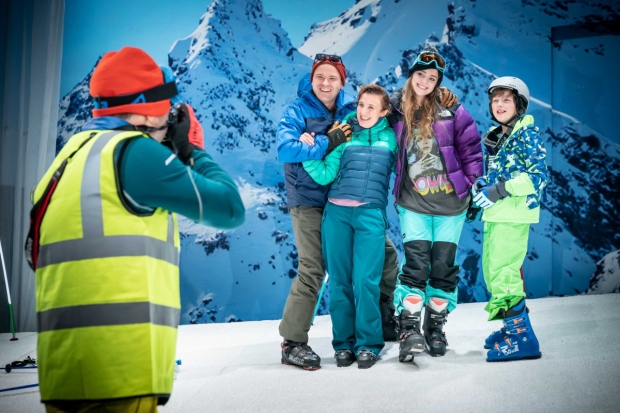Force Majeure at Donmar Warehouse – review
Rory Kinnear and Lyndsey Marshal star in the dark comedy

© Marc Brenner
Ruben Östlund's Force Majeure was a 2014 film of aching, white spaces, a study of the space between people and the rifts, as deep as mountains, that can open up when one person's behaviour reveals a void. Its psychology was expressed by its ski-resort setting and the idea of transposing its stunning Alpine views and bleak white outs to the stage of the Donmar seemed almost preposterous. It felt as if it would simply lose too much in translation.
Yet, by playing up the comedy and making the moral and emotional dilemmas more clearly underlined, Tim Price's adaptation just about pulls it off. It is funnier and more obvious than the movie, emphasising the way that Tomas and Ebba and their children, the family at its heart, are always at sea in the swish setting where they have chosen to go on holiday.
Michael Longhurst's busy production on Jon Bausor's white-carpeted, steeply raked set, with its mountain backdrop bisected by a hotel lift, contrasts their unhappy ungainliness with the sleek, colourful skiers who (rather thrillingly) whizz down the slopes, striking a pose, courtesy of Sasha Milavic Davies' lively choreography.
Rory Kinnear's Tomas exudes fake bonhomie, as ill fitting as his ski-wear, encouraging his son up the mountain with a plea to rise to the challenge. "It's all good, character-building stuff," he says, with a harassed smile. But the point about Force Majeure is that when nature poses its ultimate challenge – an avalanche that stops feet away from the family – Tomas flunks the test. Ebba (Lyndsey Marshal) cannot forgive him, not only for what he does, but because he denies it. A marriage always built on shaky foundations, begins to disintegrate in front of our eyes.
The programme essay relates Tomas's behaviour to conversations around climate change, to the idea that a certain white male attitude, a need to see themselves as heroic whatever the truth, relates to their attempt to subdue nature itself to its desires.
On the Donmar stage, where it is impossible to avoid the unreality of the snow or to appreciate the majesty of the landscape, this metaphor feels like more of a reach than it did on the screen. In any case, I am not sure it is the main intent of the piece which feels principally like a tragi-comic study of a man crippled by his own failed aspirations and resulting self-loathing.
Kinnear is the perfect actor to express the bluster that hides the panic beneath the skin; his performance is a master class in nuance, one that expresses his profound discomfort with the way his eyes dart in his frozen face, the twitch of a hand in a pocket, the smallest of movements from foot to foot. His journey from denial to a sort of acceptance is achieved through a breakdown that is at once comic and moving.
As Ebba, Marshal is convincing but hindered by the script's insistence on pushing her character into put-upon cliché; her screen counterpart is slightly less harassed housewife in shape and has more sense of an inner life that is being subdued. Sule Rimi as Mats, whose own notions of masculinity are threatened by his friend's crisis, and Siena Kelly as his buoyant girlfriend Jenny, provide excellent support.
Thanks to such fine performances, the play makes its mark as a study of all the complex interactions of family relationships. But in shrinking itself to theatre-size, it never quite finds the intensity to replace those mountain tops with a journey into the heart of a man.












